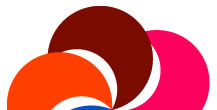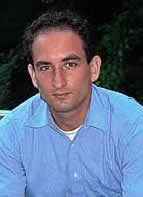Founder's Bio
Nicolás Canales started SpanishBlackbelt in the spring of 2004. Since then, the school has kept growing in the competitive US language market, having trained more that a thousand students and counting.
Born in 1972 in Lima, Peru, having access to the truly privileged bracket of society, although always thinking that he belonged to the middle class, Nicolas grew up in the upscale Miraflores neighborhood. Nicolas attended one of the most exclusive private high schools in Lima, always being the class valedictorian year after year, even managing to achieve the highest GPA in the school's history thanks to the support of his mother, who sat down to study with him many times, while friends in the neighborhood played football all afternoon. His father, a civil engineer and strong figure with military upbringing, always celebrated his achievements and successes with great excitement, eventually nicknaming him Mr. Twenty, twenty being the highest grade in Peru, even though at times he had to change it to Mr. 21, as it was not uncommon for teachers at his school to do a curve to 20, which made him surpass the maximum possible due to some occasional extra points given.
Yes! He may have been perceived as being a little nerd, although he never thought of him as one. He just enjoyed the adrenaline that he felt while archiving these highest grades. Surfing daily with his older brothers at a pebble beach down the cliff where their house was located was perhaps the activity that he did that allowed him to feel normal.
His dad dreamed of being an entrepreneur and worked many times as a independent contractor although never managed to have the steady success that he expected, always bringing financial pressure to their family because of not knowing if they could met their needs. It is under this uncertainly that, in order to meet some of his own financial needs, Nicolas started doing private tutoring to other students his age and younger, while still in high school.
Despite having a very tight budget at times, his mom always managed to secure the resources to rotate Nicolas through almost all of the available private language institutes in Lima, year after year, to learn English since a very young age. It was perhaps this exposure to so many different methods, books and styles that would later on give Nicolas the appreciation for language learning and the knowhow to recognize what worked and what did not.
In 1990 Nicolas got admitted into Universidad del Pacífico, the most prestigious economics sciences school in Peru thanks to his hard work at a preparatory academy that helped him cover the huge gaps that existed between level of exigency in high school and in college, exposing him again to supplementary training and alternative methods of teaching. The death of his mother during his first year in school caused a serious toll on him, performing terribly in school for the first few years, but eventually recovering and managing to graduate in 1994 with the highest score in his class, obtaining the summa cum laude maximum academic distinction, a BA in accounting, and a $5,000 cash award, which he used to fund his first incursions into being an entrepreneur, although with little success.
His studies eventually lead to a stable position at Interbank, the most profitable bank in Peru at that time. There he gained valuable experience in finance and business development, achieving a very steady source of income, increasing responsibilities and recognition. He, however, continued to manage some businesses of his own on the side in his little free time, however again with mild success. Could being cataloged many times as a book smart be impeding him from succeeding in his own ventures? That he did not know at that time.
Some family members, including his beloved aunt and uncle, had emigrated to the US very many years prior. Their progressive way of thinking, and that of their sons, his American-raised cousins certainly intrigued him. Articles that he read in many magazines such as Newsweek and Time, that he had access while studying English, portraying successful American young entrepreneurs made him wonder if he could ever aspire of being in one of their covers just like them.
In 1996 Nicolas finally decided that it was time for him to give the American dream a shot. He therefore applied to several business schools in the US but was rejected by all of the schools that he applied to. No reasons were given to him so he had to do a lot of self-analysis to try to understand.
Nicolas eventually came to the realization that, despite all of those years learning English, he was just not able to articulate his thoughts in English well enough, therefore not being able to give the good impression that school admissions directors expected. Also he realized that he just did not know well enough how the American idiosyncrasies worked as to be able to interact with Americans better.
But Nicolás never gave up his dream of thriving beyond his national borders; so a few years after one of the most successful projects in the bank that he worked on came to fruition, he decided to pack, leave his comfort zone, and take the risk of life to reach for what he really wanted: starting a successful US-based business, even though he had no clue as to what type of business he would form that would have some relevance in the American soil.
Upon his arrival in Washington D.C., in 1999, reality struck him while trying to order a sandwich at Subway, the well-known sandwich chain, and not being able to understand or make himself understood as to what ingredients he wanted in his sandwich, perhaps because of a lack of sufficient vocabulary or because of the lack of proper conversational and listening skills, and familiarity with different accents.
During his first year, he put all his will and self-discipline into polishing his English by enrolling at the Foreign Languages Department at Georgetown University, and interning at a couple of Dotcom startups to learn a little bit more of the culture and to continue practicing applying his english in a real business setting, while working on his second attempt into being accepted into Business School.
This time, in 2001, just as saving were drying out, luck was more on his side or perhaps he simply got better. A package came in the mail. He was being invited to join the Vanderbilt University Owen School of Management along with a full-tuition scholarship, which he accepted with great relief, eventually earning his MBA with a concentration in Marketing and Information Technology.
While in Vanderbilt University, he seized the opportunity to expand his horizons through an exchange program in Japan during his last semester. Traveling to Japan, a land so exotic and so different to the western world, was a dream he never though possible, yet even more to have the chance to live and study there for a semester. Living in Japan reaffirmed his notion of the value that knowing a foreign language would allow a person to get more immersed into the subtleties of a foreign culture.
After he completed his MBA in 2003 and was back in D.C., Nicolas struggled to get hired. The Enron collapse attributed in part to the many “smart people in the room”, the MBAs, and the e-commerce collapse and subsequent economic bubble burst crisis made it really hard for foreign MBAs at that time to even land an interview. Experiencing adversity another time, and with funds again dissipating, Nicolas made the decision to start tutoring as a means to support himself, just like he did while in high school, while still on the hunt for a steady job. This time, though, he will start tutoring something people in the US were craving, the Spanish language. His ability to connect with people, inspire them to believe that speaking in a second language was something they could achieve, and listen to their needs and frustrations allowed him to retain his first clients so well that soon enough he found himself tutoring up to 12 hours daily, at times feeling like fainting in front of the students out of exhaustion. Instead of giving up at that time, he stopped looking for a steady job altogether and concentrated his efforts into transforming his tutoring activity into a full time business, eventually hiring the first tutor, other than him, in 2004.
Starting a business from the ground up was not easy, but Nicolás persevered. He learned from his mistakes, listened to his collaborators and customers, and did careful analysis of what worked for his students and what didn't, which Nicolás believes was the real key to his success.
Today, after 23 years in the United States, Nicolás has consolidated his position in the language-learning sector. His business, SpanishBlackbelt, now gathers over 18 years of experience and a solid position in the language-teaching sector with an A+ in the Better Business Bureau rating, has received awards, praise and recognitions on several occasions and there have been appearances in the media praising his good work. His hard work has clearly born fruit. Currently, Nicolás employs a significant number of tutors across the country and serves customers online and in person in twelve States, with the prospect of continuing expansion.
The SpanishBlackbelt school's primary focus is to facilitate its clients with rapid development of practical and useful conversational language skills and cultural background for success in business, academia, travel and social settings, so that customers are able to communicate in Spanish verbally in just a few months, something many of them had not been able to achieve in years of studying at school, just like he struggled himself as a youngster.
Different from many traditional language schools, SpanishBlackbelt does not own headquarters where classes are held; instead, tutor and students meet live online or, when possible, in a public place, generally a coffee shop, creating a relaxed and natural environment that eases conversation and learning. The savings of not having formal classrooms allows the school to dedicate more resources on fine-tuning the method, developing proprietary learning materials, and paying fair salaries to attract the most passionate tutors in their payroll.
The school’s courses are all based on principles of personalization, simplicity, common sense, only in Spanish, with native Spanish tutors, positive reinforcement in a lively, fun and relaxing atmosphere, participation, very small groups, and a steady exposure to cultural, social and economic aspects of Latin American countries.
Intellectually, Nicolas now enjoys spending time writing code in different programing languages, and is starting to learn italian, which he aspires to become his fourth well-spoken language, after Spanish, English and Portuguese. Living in the US allowed Nicolas to discover scuba diving, snow skiing, wake boarding, and most recently Kite boarding, sports that he never even dreamed of before, and that now are his passions that keeps him feeling the same, if not more, rush he felt when surfing with his brothers on a daily basis in Lima while growing up.
Nicolas lives in a fully bilingual household with his partner, dog and two cats, who respond to commands both in English, Spanish and Portuguese. Mastering a second language allowed him to cross borders, launch a successful business, meet a wonderful partner, and embrace a second culture, lifestyle and home.
|
Seattle |








